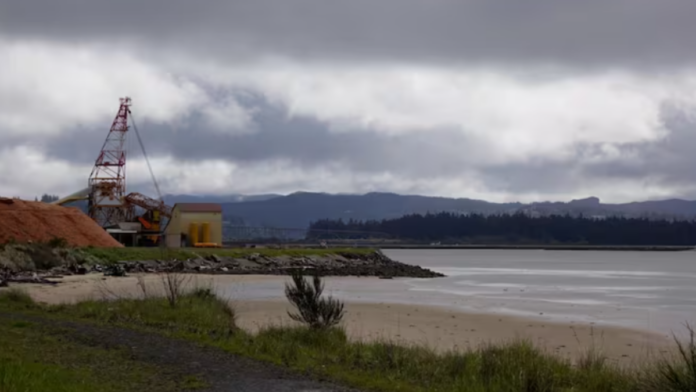
The Jordan Cove liquefied natural gas export facility planned for Coos Bay, Oregon hit another speedbump as the state’s land and environmental officials denied a permit to the company behind the project just as federal regulators were poised to vote on the facility this week.
The letter from Oregon’s Department of Land Conservation and Development to Pembina Pipeline Corp, the company behind the Jordan Cove project, objected to “adverse effects” that would accompany the export terminal’s completion, halting the Federal Energy Regulatory Commission’s approval.
“After careful review of the proposed project, in conjunction with receiving extensive public comment, and coordination with coastal partners, DLCD has determined that the coastal adverse effects from the project will be significant and undermine the vision set forth by the OCMP [Oregon Coastal Management Program] and its enforceable policies,” DLCD wrote.
“As a result of this objection, neither FERC nor the Corps [U.S. Army Corps of Engineers] can grant a license or permit for this project unless the U.S. Secretary of Commerce overrides this objection on appeal,” the letter continued.
FERC member Bernard McNamee said he wanted to allow more time for review of the project following the denial of the permit by DLCD.
“I’m going to be voting nay today on Jordan Cove, but that is not a hard nay,” McNamee said. “That’s merely my recognition that yesterday the state of Oregon provided a letter apparently to the applicant regarding its permits. I want to see what the state of Oregon said and I need that information to inform my decision.”
McNamee’s vote resulted in a 2 to 1 decision not to move forward at this time, though it would appear that the project enjoyed support from two of three members of the FERC commission. The delay by FERC is “not a denial” according to Chairman Neil Chatterjee.
“The application remains pending before the commission and we will vote on this when we are ready,” Chatterjee said.
In a statement Thursday U.S. Rep. Scott Tipton (R-Colo.) urged FERC to “minimize any further delays in permitting” for the Jordan Cove project.
“Jordan Cove meets the high standards of design, public benefit, and environmental preservation that are outlined under the Natural Gas Act. The project is also essential to ensuring Western states and Native American tribes have the opportunity to access overseas energy markets and enjoy the economic benefits of LNG exports,” Tipton said.
The positive impact on western states, including the western slope of Colorado that Tipton represents in Congress, would be difficult to ignore, he said.
“Western Colorado has a unique role to play in seizing this export opportunity. A growing demand around the world for natural gas has given Colorado a chance to further responsibly develop natural gas deposits in the Piceance Basin in northwest Colorado, which has been identified by the U.S. Geological Survey as North America’s second largest natural gas reserve,” he added.
The project has enjoyed strong bipartisan support throughout the permitting process, as Western Wire has previously reported. That includes U.S. Sen. Michael Bennet (D) and Sen. Cory Gardner (R), as well as other elected officials.
Tipton noted the project’s “strong local support” and that further “delays in permitting will threaten existing export contracts, economic opportunity in Western Colorado, and the prospect of decreasing global carbon emissions.”
